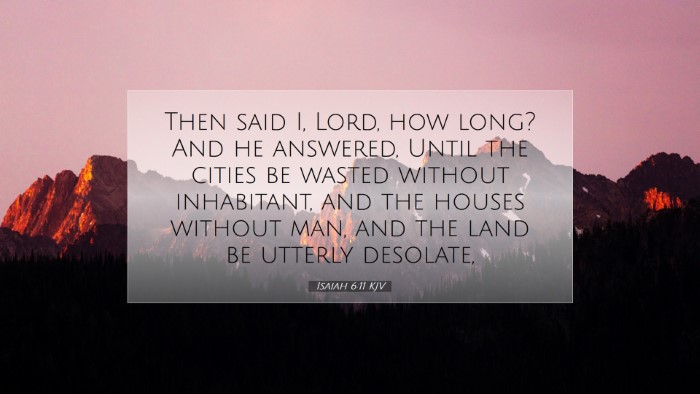Isaiah 6:11 - A Commentary on God's Judgment and Mercy
Verse: "Then said I, Lord, how long? And He answered, Until the cities be wasted without inhabitant, and the houses without man, and the land be utterly desolate." (Isaiah 6:11)
Contextual Background
The call of Isaiah is set in a pivotal moment in Israel's history, where the nation was mired in sin and rebellion against God. This chapter provides the prophet’s commissioning and reveals both divine majesty and the seriousness of sin that leads to impending judgment.
Interpretation and Insights
Matthew Henry's Insights: Henry points out that the question posed by Isaiah reflects both a sense of urgency and a deep concern for his people. The prophet, having seen God's holiness and being cleansed from sin, is now acutely aware of the impending doom faced by the people of Judah. God's response underscores the severity of the situation — indicating that the judgment is designed to bring about a complete desolation of cities, homes, and ultimately the land itself.
Impact of Judgment
Judgment here serves a dual purpose: it acts as a corrective measure and as a means for God to demonstrate His holiness. The catastrophic results of this judgment will be profound, as it signifies God's withdrawal of His presence from a people who have persistently rejected Him. Henry emphasizes that this serves as a warning and an admonition against sin.
Albert Barnes' Perspective:
Barnes elaborates on the phrase “how long?” as a reflection of Isaiah's deep concern for the nation. He interprets God’s answer as stretching to a time of complete devastation — "until the cities be wasted." This indicates that there is a limit to God’s patience with sin, and the consequences will be explicitly severe. He also notes the utilization of the verb “to waste” accents the total annihilation of spiritual, physical, and communal life in Judah.
The Role of the Prophetic Voice
In this context, Isaiah's prophetic voice is significant — a voice that is now burdened with the knowledge of impending devastation. God’s direction serves as a sobering reminder of the long-term ramifications of disobedience. This mirrors the somber realities that pastors today must confront: how long must God bear with disobedience before executing His righteous judgment?
Adam Clarke's Commentary:
Clarke pays particular attention to the existential weight of Isaiah's prophetic commission and the implied distress that God’s answer carries. The determination of 'until' delineates the timeline of divine judgment and reflects God's ultimate sovereignty. Clarke emphasizes that this context also sheds light on the grace that accompanies judgment; even in desolation, God's redemptive intent persists, with the hope of restoration after judgment.
Theological Reflection
Isaiah 6:11 serves as a reminder that God's patience is not eternal—His justice and holiness necessitate that sin's consequences be realized. The full meaning of this verse invites pastors and theologians to consider the balance of God's mercy and judgment. While the text depicts devastation, it is integral to remember that this leads to refinement and restoration for the faithful remnant.
Applications for Today
The stark realities presented in Isaiah 6:11 challenge contemporary believers to examine personal and communal sin within the church. It urges leaders to address the spiritual condition of their congregations with urgency and a prophetic voice that calls for repentance. Every generation must grapple with the profound question posed by Isaiah: “How long?” and seek to avert the desolation that follows unrepentant sin.
Conclusion
Isaiah 6:11 encapsulates a significant lamentation concerning the people's disobedience and the tragic consequences thereof. The insights from public domain commentaries by scholars like Matthew Henry, Albert Barnes, and Adam Clarke provide a multifaceted understanding of this somber reality. It calls for a humble response from the faithful to engage in profound self-examination and embrace God’s grace while recognizing His justice.


